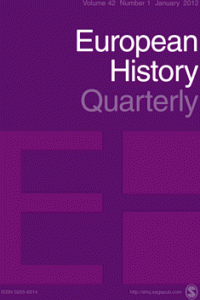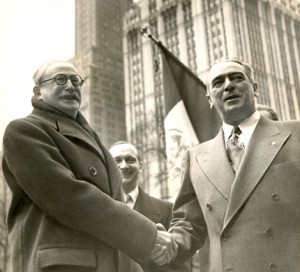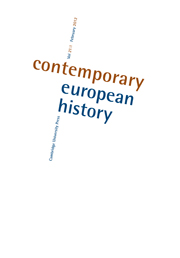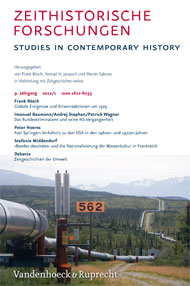 The new issue of “European History Quarterly” of January 2012 is now available online and includes the following articles:
The new issue of “European History Quarterly” of January 2012 is now available online and includes the following articles:
Rhetoric and the Writing of History in Early Modern Europe: Melo’s Guerra de Cataluña and Mascardi’s Ars historica
“In 1645 the Portuguese historian Francisco Manuel de Melo published the Historia de los movimientos, separación y guerra de Cataluña, an account of the so-called ‘Rebellion of Catalonia’ against the Spanish monarch Philip IV. Although the accuracy of the book has been the subject of controversy, very little has been said about its discursive strategies, in spite of its having been considered ‘an exceptional work’ (Menéndez y Pelayo 1893) and ‘full of perfections’ (Rosell 1852) in terms of its elocutio. The aim of this paper is to analyze the historiographical strategies that govern the construction of the Historia, in an attempt to place the early modern writing of history within a tradition that goes back to the ancient rhetoricians. In the particular case of Melo, the most immediate reference is that of the Dell’arte istorica (1639), a treatise by the Italian Jesuit Agostino Mascardi, specifically mentioned and praised by Melo.”
The Early Reception of Operetta in Russia, 1860s–1870s
“This article explores the popular and critical reception of operetta in Russia during its European heyday, which broadly coincided with the transformative reign of Tsar Alexander II (1855–1881). It argues that the genre consistently drew audiences from most social strata and should not be considered, as some historians have suggested, a uniquely ‘bourgeois’ form of entertainment closely associated with the rise of the middle classes. It also argues that operetta crystallized a range of wider concerns about Russian culture and politics during the era of the Great Reforms. Many critics attacked operetta’s frivolity and eroticism (held to be inconsistent with the aims of art), while radicals and conservatives regarded it as symptomatic of a new climate of political uncertainty (the former with hope, the latter with trepidation). The critical responses to operetta thus testified to its popularity and to the rapidity of change in Russia during the 1860s and 1870s.”
The French Veterans and the Republic: The Union nationale des combattants and the Union fédérale, 1934–1938
“Since Antoine Prost’s Les anciens combattants et la société française, 1914 – 1939 (1977), subsequent histories of the period have largely accepted the benign role of French Great War veterans during the interwar period. In focusing on the period between the riots of 6 February 1934 and the Daladier government in 1938, this article re-examines the history of the veterans from the perspective of their movement for state reform. The two largest associations, the Union nationale des combattants (UNC) and the Union fédérale (UF) undertook a campaign for an authoritarian reform of the Republic. Though united in their belief in reform, the associations’ motives differed starkly. Furthermore, activists and moderates fought for the meaning of their groups’ policies and for the meaning of their very associations. Circumstances dictated the strength of each faction. With a focus on the UNC and the UF, this article argues that neither their alleged Republicanism, nor their shift to authoritarianism were governed by an inherent nature. The article demonstrates that the political culture of the late Third Republic was complex and dynamic, with the politics of groups subject to internal and external influences and fluctuations.”
Nationalism, Myth and Reinterpretation of History: The Neglected Case of Interwar Yugoslavia
“This article discusses and challenges some popular myths and perceptions about interwar Yugoslavia in post-socialist (and post-Yugoslav) Serbia. These include discourses that blame ‘others’ – ‘treacherous’ Croats and other non-Serbs, the ‘perfidious’ west, especially Britain – and that are also self-critical, of Serbs’ ‘naivety’ as exemplified in their choosing to create Yugoslavia at the end of the First World War, and of, later, embracing communism. The article also offers a reassessment of the interwar period, often neglected by scholars of former Yugoslavia.”





 A new issue of
A new issue of 

